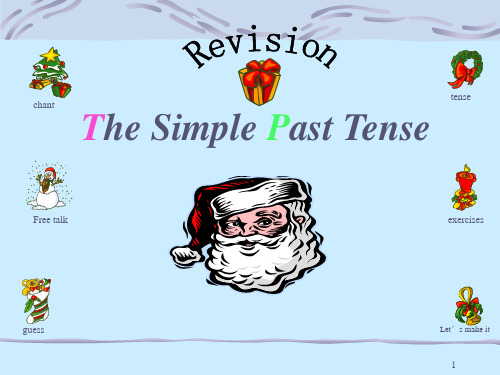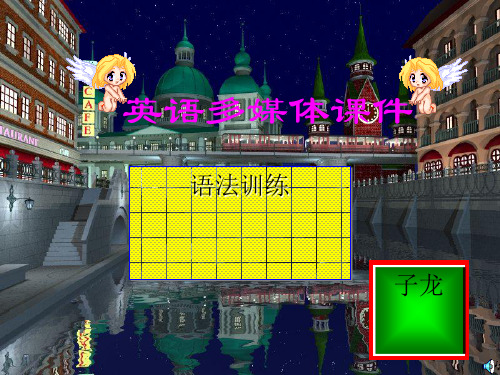小学英语一般过去时 ppt课件
合集下载
一般过去时学习ppt课件

Lucy __d_id_n_’_t_ ___d_o___ her homework at home. 2、He found some meat in the fridge.(变一般疑问句)
__D_i_d__ he __f_in_d_ ___a_n_y_ meat in the fridge? 3、She stayed there for a week.(对划线部分提问)
2、His father worked all day last Monday.(改一般疑问句) __D_i_d__his father ___w_o_r_k__ all day last Monday?
3、 I was very busy last week. (改否定句和一般疑问句) I __w__as_n_’_t_ very busy last week. _W__er_e_ you very busy last week?
2. 结尾是 e 的动词加 -d
3. 末尾只有一个辅音字母的重读 闭音节词,先双写这个辅音字 母,再加-ed
look play start live hope use
stop plan trip
looked played started lived hoped used
stopped planned tripped
/t/ /d/ 之后念 /id/ , 即 ed 在 /t/ /d/ 音后面念 /id/
例:wanted shouted needed counted
“雪亮工程"是以区(县)、乡(镇) 、村( 社区) 三级综 治中心 为指挥 平台、 以综治 信息化 为支撑 、以网 格化管 理为基 础、以 公共安 全视频 监控联 网应用 为重点 的“群 众性治 安防控 工程” 。
一般过去时(公开课)ppt课件

Santa Claus’s trip to the world
Watch a video
精选ppt课件2021
1
Santa’s Trip to Changping
一般过去时 The simple past tense
From: 望牛墩精中选ppt学课件2021By: Miss Xia
2
Hello ! Merry Christmas !
3. What did he do in those cities?
He _s_e_n_t_/g_a_v_e__ Christmas
presents to some sick children.
精选ppt课件2021
4
What did Santa do last week in China?
1.He _b_o_u_g__h_t a Christmas tree and some
presents. A. buy B. bought
2. He _s_e__n_t __
some Christmas
cards to his friends.
A. sent B. send
精选ppt课件2021
5
What did Santa do last week in China? 3. He _h__a_d___ a big dinner with children.
13
The simple Past Tense一般过去时的结构
Is there a card in the box ? Was there a card in the box ?
1. Did you receive a Christmas present last year?
Watch a video
精选ppt课件2021
1
Santa’s Trip to Changping
一般过去时 The simple past tense
From: 望牛墩精中选ppt学课件2021By: Miss Xia
2
Hello ! Merry Christmas !
3. What did he do in those cities?
He _s_e_n_t_/g_a_v_e__ Christmas
presents to some sick children.
精选ppt课件2021
4
What did Santa do last week in China?
1.He _b_o_u_g__h_t a Christmas tree and some
presents. A. buy B. bought
2. He _s_e__n_t __
some Christmas
cards to his friends.
A. sent B. send
精选ppt课件2021
5
What did Santa do last week in China? 3. He _h__a_d___ a big dinner with children.
13
The simple Past Tense一般过去时的结构
Is there a card in the box ? Was there a card in the box ?
1. Did you receive a Christmas present last year?
小学英语一般过去时态讲解及习题ppt课件

27
A: What day_i_s_ it today ? B: It _is_ Sunday. A: What day _w_a_s_it yesterday?B: It_w_a_s_Saturday. A: What day _w_a_s_ it the day before yesterday ?
39
It was sunny.
The vacations were great .
How was the weather ? How were the vacations ?
I did my homework yesterday.
What did you …do…?
She played soccer last Sunday.
Did they have…?
My father went to the beach three years ago.
Did your father go…?
Tom and Jack studied for the test three days
ago. Did Tom and Jack study…?
I did my homework yesterday.
Did you do…?
Sshe play…?
He cleaned his room last week.
Did he clean…?
They had a summer camp last weekend.
What did she …do…?
30
Exercise 1. _W_e_r_e_(be) you busy yesterday afternoon? 2. She _w__a_s _ (be) at school this morning. 3. Jane and Ann w__er_e_n_’(tbe not) friends before. 4. He _d_i_d_n_’(tdo not) live in Guangzhou
A: What day_i_s_ it today ? B: It _is_ Sunday. A: What day _w_a_s_it yesterday?B: It_w_a_s_Saturday. A: What day _w_a_s_ it the day before yesterday ?
39
It was sunny.
The vacations were great .
How was the weather ? How were the vacations ?
I did my homework yesterday.
What did you …do…?
She played soccer last Sunday.
Did they have…?
My father went to the beach three years ago.
Did your father go…?
Tom and Jack studied for the test three days
ago. Did Tom and Jack study…?
I did my homework yesterday.
Did you do…?
Sshe play…?
He cleaned his room last week.
Did he clean…?
They had a summer camp last weekend.
What did she …do…?
30
Exercise 1. _W_e_r_e_(be) you busy yesterday afternoon? 2. She _w__a_s _ (be) at school this morning. 3. Jane and Ann w__er_e_n_’(tbe not) friends before. 4. He _d_i_d_n_’(tdo not) live in Guangzhou
一般过去时,一般现在时,一般将来时ppt课件

What do the elephants like eating?
4. He sends two emails every week.
How many emails does he send every week?
How often does he send two emails?
5. 5.He has lunch at school. 6. Who has lunch at school?
否定句:主语+助动词didn’t+动词原形+其它 •She didn’t do homework yesterday. 一般疑问句:Did +主语+动词原形+其它 •Did she do homework yesterday? Yes,she did./No,she didn’t.
4. 4. Daming watchs TV in the evening. watches
5. 5. Does he usually has a party? have
6. 6. What do they on do onSunday? Sunday
7. 7. Tony goes goes always to school at eight o’clock. always
8. 8. What do they eat in the party?
9. 9. Lily haves lunch at school. has
一般过去时:Past Simple
表示过去发生的动作或存在的状态
行为动词的一般过去时:
陈述句:主语+动词过去式+其它 •She did homework yesterday .
4. He sends two emails every week.
How many emails does he send every week?
How often does he send two emails?
5. 5.He has lunch at school. 6. Who has lunch at school?
否定句:主语+助动词didn’t+动词原形+其它 •She didn’t do homework yesterday. 一般疑问句:Did +主语+动词原形+其它 •Did she do homework yesterday? Yes,she did./No,she didn’t.
4. 4. Daming watchs TV in the evening. watches
5. 5. Does he usually has a party? have
6. 6. What do they on do onSunday? Sunday
7. 7. Tony goes goes always to school at eight o’clock. always
8. 8. What do they eat in the party?
9. 9. Lily haves lunch at school. has
一般过去时:Past Simple
表示过去发生的动作或存在的状态
行为动词的一般过去时:
陈述句:主语+动词过去式+其它 •She did homework yesterday .
小学英语时态之 一般过去时讲解课件ppt

一般过去时态
一般过去时:
定义: 一般过去时,是表示过去某一时刻或某一段时间内发生的动作或存在
的状态。
标志词: yesterday, just now, …ago, last…, this morning …
结构: 谓语是be动词
谓语是行为动词
肯定句: 主语+ was/were + 其他 否定句: 主语+ was/were + not + 其他 一般疑问句: Was/Were + 主语+其他? 肯定句: 主语+ 动词的过去式 + 其他 否定句: 主语+ didn’t +动词原形 + 其他 一般疑问句:Did + 主语+ 动词原形 +其他?
at the weekends this morning often
usually
last Mid-Autumn Festival
every day three days ago on Mondays
tomorrow a moment ago 14 years ago
找出表示一般过去时的时间副词。
( B) 1. My mother had breakfast and____to work.
A. go B. went C. going D. to go
( A)2. -- How __ your vacation?
-- It was pretty good. A. was B. were C. did D. do
( )3.Each student one picture.
A.draw B. draws C. drawing D.to drawing
一般过去时:
定义: 一般过去时,是表示过去某一时刻或某一段时间内发生的动作或存在
的状态。
标志词: yesterday, just now, …ago, last…, this morning …
结构: 谓语是be动词
谓语是行为动词
肯定句: 主语+ was/were + 其他 否定句: 主语+ was/were + not + 其他 一般疑问句: Was/Were + 主语+其他? 肯定句: 主语+ 动词的过去式 + 其他 否定句: 主语+ didn’t +动词原形 + 其他 一般疑问句:Did + 主语+ 动词原形 +其他?
at the weekends this morning often
usually
last Mid-Autumn Festival
every day three days ago on Mondays
tomorrow a moment ago 14 years ago
找出表示一般过去时的时间副词。
( B) 1. My mother had breakfast and____to work.
A. go B. went C. going D. to go
( A)2. -- How __ your vacation?
-- It was pretty good. A. was B. were C. did D. do
( )3.Each student one picture.
A.draw B. draws C. drawing D.to drawing
一般过去时获奖课件

一般过去时态
Learning Aims
1.掌握一般过去时旳意义,使用方法,构成 及其用于一般过去时旳时间状语。
2.能够写出部分不规则动词旳过去式。
3.掌握一般过去时旳句式变换,一般疑问句, 否定句,特殊疑问句。
什么是一般过去时?
意义:动词旳一般过去时态表达 过去某个时间发生旳动作 或存在旳状态。
T
They didn’t finished their
homework last night.
F
巧记不规则动词过去式
1.中间去e,末尾加t 如:
keep→kept, feel→felt,
sleep→slept,sweep→swept 2.结尾d变t 如:
build→built,lend→lent,
上一页 点击跳过答案
11. We often _p_la_y__ (play) on the playground.
12. He __g_e_t_s _ (get) up at six o’clock. 13. __D_o_ you _b_ru_s_h_ (brush) your teeth every morning? 14. Danny _s_tu_d_ie_s___(study) English, Chinese, Maths, Science and Art at school. 15. Mike sometimes __g_o_e_s(go) to the park with his sister.
昨天,早餐我吃面条。 I __h_a_d noodles for breakfast yesterday morning.
他每天都吃水果。
He __h_a_s_ fruit every day.
Learning Aims
1.掌握一般过去时旳意义,使用方法,构成 及其用于一般过去时旳时间状语。
2.能够写出部分不规则动词旳过去式。
3.掌握一般过去时旳句式变换,一般疑问句, 否定句,特殊疑问句。
什么是一般过去时?
意义:动词旳一般过去时态表达 过去某个时间发生旳动作 或存在旳状态。
T
They didn’t finished their
homework last night.
F
巧记不规则动词过去式
1.中间去e,末尾加t 如:
keep→kept, feel→felt,
sleep→slept,sweep→swept 2.结尾d变t 如:
build→built,lend→lent,
上一页 点击跳过答案
11. We often _p_la_y__ (play) on the playground.
12. He __g_e_t_s _ (get) up at six o’clock. 13. __D_o_ you _b_ru_s_h_ (brush) your teeth every morning? 14. Danny _s_tu_d_ie_s___(study) English, Chinese, Maths, Science and Art at school. 15. Mike sometimes __g_o_e_s(go) to the park with his sister.
昨天,早餐我吃面条。 I __h_a_d noodles for breakfast yesterday morning.
他每天都吃水果。
He __h_a_s_ fruit every day.
一般过去时时态ppt课件

精选课件
3
第二个-----“四种时间状语”
• ① yesterday及相关短语。
• 例如:
• yesterday morning/afternoon/evening • 昨天上午/下午/晚上。 • ② “last+ 时间状语”构成的短语。 • 例如:
• last night/month/spring/year
“四种句式的构成”—有be动词
• ①肯定句:主语+was/were +其它 . • 例如:We were late yesterday. • 昨天我们迟到了。 • ②否定句:主语+was /were+not +其它. • We weren't late yesterday. (我们昨天没迟到
精选课件
精选课件
5
第三个—“四种谓语动词的表现形式”
• ① be动词的过去式was、were.
• 例如:She was a teacher five years ago.
• 她五年前是一名教师。
• ② 连系动词(连接主语和表语)的过去式。
• 例如:become-became She became angry.
• 1. They produce silk in Suzhou.(改为一般疑问 句)
• ___________________________________? • 2. They built a bridge between the two islands. (
改为否定句)
• ___________________________________?
• 詹妮昨天买了一件短裙。
• ② 一般过去时态的否定句式 “主语 +didn’t+动词原形+其它”
讲解(一般过去时)ppt课件

4
句型变化 1.系动词be
陈述句(肯定): She was a doctor two years ago. 陈述句(否定): She was not a doctor two years ago. 一般疑问句: Was she a doctor two years ago?
肯定回答:Yes, she was. 否定回答:No, she wasn’t. 特殊疑问句: When was she a doctor?
5
动词一般过去时,表示过去发生的事; be用was或用were, have,has变had; 谓语动词过去式,过去时间坐标志; 一般动词加-ed,若是特殊得硬记。 否定句很简单,主语之后didn’t添; 疑问句也不难,did放在主语前; 如果谓语之前有did,谓语动词需还原; 动词若是was,were,否定就把not添。
• 为什么她去年离开了学校? Why did she leave the 时
• 1.定义: 1)表示过去某个时间发生的动作或存在的状态,常和 表示过去的时间状语连用;2)也表示过去经常或反复发生的动 作,常和表示频度的时间状语连用。
• 标志性状语
2.时间状语:yesterday last night
6
7
8
• 1. look • 4. carry • 7. call • 10.like • 13.dance • 16.stay
2. live 5. hope 8. finish 11.play 14.cry 17.cook
3. stop 6. trip 9. want 12.watch 15.plan 18.invent
3. _____________________ on Sundays. They went to the park last Monday.
句型变化 1.系动词be
陈述句(肯定): She was a doctor two years ago. 陈述句(否定): She was not a doctor two years ago. 一般疑问句: Was she a doctor two years ago?
肯定回答:Yes, she was. 否定回答:No, she wasn’t. 特殊疑问句: When was she a doctor?
5
动词一般过去时,表示过去发生的事; be用was或用were, have,has变had; 谓语动词过去式,过去时间坐标志; 一般动词加-ed,若是特殊得硬记。 否定句很简单,主语之后didn’t添; 疑问句也不难,did放在主语前; 如果谓语之前有did,谓语动词需还原; 动词若是was,were,否定就把not添。
• 为什么她去年离开了学校? Why did she leave the 时
• 1.定义: 1)表示过去某个时间发生的动作或存在的状态,常和 表示过去的时间状语连用;2)也表示过去经常或反复发生的动 作,常和表示频度的时间状语连用。
• 标志性状语
2.时间状语:yesterday last night
6
7
8
• 1. look • 4. carry • 7. call • 10.like • 13.dance • 16.stay
2. live 5. hope 8. finish 11.play 14.cry 17.cook
3. stop 6. trip 9. want 12.watch 15.plan 18.invent
3. _____________________ on Sundays. They went to the park last Monday.
小学英语一般过去时课件

写作应用练习
描述过去发生的事情 写日记或回忆录 描述过去的活动或经历 编写与过去相关的故事或文章
总结回顾与拓展延
08
伸
重点内容回顾
一般过去时的定义和用法
动词过去式的变化规则
常见句型结构及例句
易混淆时态的辨析
拓展延伸:一般过去时的其他用法介绍
添加标题
规则动词的过去式变化:大部分动词的过去式是在动词原形后面加上-ed,如played、talked 等。
• 动词变化的区别:一般过去时的动词需要用动词的过去式,如played、talked等;而现在完成时的动词 则用have+过去分词的形式,如have finished、have talked等。
• 句式结构的区别:一般过去时通常使用一般过去时的基本句式结构,如“主语+动词过去式+时间状 语”;而现在完成时则需要使用“主语+have+过去分词+时间状语”的结构。
一般过去时的常见
04
形式
动词过去式分类
规则动词过去式:一般动词加-ed,如play-played 不规则动词过去式:需要单独记忆,如go-went 特殊动词过去式:无规律可循,如have-had 动词过去式的时态意义:表示过去某个时间发生的动作或状态
规则动词过去式变化规律
规则动词过去式的构成:大部分动词在词尾加-ed,但也有部分动词词尾发生变化
注意事项
单击此处添加标题
定义:一般过去时表示过去某个时间发生的动作或状态
单击此处添加标题
用法:一般过去时通常与表示过去的时间状语连用,如yesterday, last night等
单击此处添加标题
动词形式:一般过去时的动词形式为动词的过去式,如played, visited等
小升初 六年级英语语法 一般过去时 动词过去式 课件ppt

3.They _____ in the USA last year.They _____ in China
now.
A.are ; were B.were ; are
C.was ; are
D.were ; was
Listen carefully
4. 实意动词过去式的变化规则
I walk to school every day.
一起练练吧
写出下列动词的过去式
like -- ______
do -- ______
dry -- ______
drop -- ______
think -- ______
know -- ______
sit -- ______
sleep -- ______
Listen carefully
一起练练吧
用动词的适当形式填空。 1)I _____ (have) an interesting party last weekend. 2)He _____ (watch) TV and _____ (read) a useful book yesterday. 3)They all _____ (go) to the mountains yesterday morning. 4)His father _____ (be) a taxi driver five years ago. 5)I _____ (take) some pictures yesterday.
我们就不:listen -- listened open -- opened visit -- visited
Listen carefully
口 诀:
• 过去式很简单,前提必须是动词 • 结尾有e只加d • 辅y结尾也不难,把y变i加ed • 末尾双写有哪些,辅音元音辅音记 • 其他动词很随和,带上ed成过去
一般过去时、过去进行时、过去完成时ppt课件

6.---Hey, look where you are going! ---Oh, I’m terribly sorry.________.
A. I’m not noticing
B. I wasn’t noticing
C. I haven’t noticed
D. I didn’t notice
19
2. Tom ___ into the house when no one ___.
A. slipped, was looking B. had slipped, looked
C. slipped, had looked looked
D. was slipping,
17
3.The last time I __ Jane she ___ cotton in the fields.
12
2、一般过去时表示只做一次动作,而过 去进行时却表示动作反复地进行。
如: She waved to me. 她朝我挥了挥手。 She was waving to me. 她一直朝我挥手。
13
3、句中有a moment ago之类的短语一般 用一般过去时。 4、句中有at this time last Sunday, from 8 to 9 yesterday 之类的状语一般用过去进 行时。过去进行时可以用来代替一般过去 时,表示更为偶然而非预定的动作: I was talking to Tom the other day. 那天我跟汤姆聊天来着。
14
典型的例子
1) Mary ___ a dress when she cut her finger. A. made B. is making C. was making D. makes
小学一般过去时ppt课件

常与表示过去的时间状语连用
如yesterday, last week等。
2024/1/26
8
肯定句使用场景举例
1 2
描述过去发生的事情
如"I went to the park yesterday."(我昨天去 了公园)。
表达过去的习惯或经常性动作
如"She always walked to school when she was young."(她年轻时总是步行去学校)。
5
时间状语及标志词
2024/1/26
时间状语
yesterday,last week,an hour ago等。
标志词
ago(以前),just now(刚才 ),then(那时)等。
6
PART 02
肯定句结构与用法
REPORTING
2024/1/26
7
肯定句结构特点
主语 + 动词过去式
表示过去某个时间发生的动作或状态。
式。
注意动词变化
掌握规则动词和不规则动词的 过去式变化,避免使用时出现
错误。
结合语境理解
在阅读和听力练习中,结合上 下文语境理解一般过去时的用
法。
模仿和练习
通过模仿和练习,逐渐熟练掌 握一般过去时的运用技巧。
2024/1/26
26
THANKS
感谢观看
REPORTING
2024/1/26
27
疑问句句尾语调上升。
2024/1/26
16
疑问句使用场景举例
对过去发生的事情进行提问。
2024/1/26
对过去某个时间点的状态进行 提问。
对过去某个时间段内发生的动 作进行提问。
英语多媒体经典课件(ppt 34页)PPT学习课件

而否定句就是在谓语动词前面加上 didn’t 然后动词变成原型。
1. They had a meeting last week.
2. Miss Li got to school twenty minutes ago.
3. I did homework on Saturday afternoon. 1. They didn’t have a meeting last week.
不规则变化
come ---came can---could may --- might leave --- left
read --- read do ---did eat --- ate have --- had write ---wrote put ---put think --- thought hear --- heard
afternoon? 2) What did Tim do last Sunday
afternoon? 3) When did Tim play football?
• 过去时的特殊疑问句
• 1) My parents studied in the USA When
•
①
②
③
• they were young.
He played basketball. She went to school.
Please look at the following sentences
I am twelve years old.
I was eleven years old.
He is in Beijing now.
He was in Shanghai yesterday.
They are in China today.
一般过去时(课件)译林版英语六年级上册

A.were
B.are
C. do
( A ) 4. Jimmy_______ absent ________ school last week.
A.was; from
B. is; from
C. was; for
( C ) 5. They _______ at _________ last Monday.
I planted a tree in front of my house yesterday. 昨天我在我家房前栽了一棵树。 John studied Chinese in Beijing last year. 约翰去年在北京学习汉语。
一般过去时(2)——实义动词
用法:②表示过去一段时间经常或反复发生的动作。如:
特殊疑问句:特殊疑问词+ was/ were + 主语+ 其他?
Where were you last night? 你昨晚在哪里?
I was at Tom’s. 我在汤姆家。
When was he in the country? 他什么时候在乡下的?
He was in the country from Monday to Saturday. 他从周一到周六都在乡下。
一般过去时(2)——实义动词
实义动词的过去式:一般过去时的谓语动词要用动词的过去式。 动词过去式的构成有规则变化和不规则变化两种形式。 规则变化: ②在以字母e结尾的动词后,只加-d。如: like→liked shave→shaved arrive→arrived
一般过去时(2)——实义动词
实义动词的过去式:一般过去时的谓语动词要用动词的过去式。 动词过去式的构成有规则变化和不规则变化两种形式。 规则变化: ③在以“辅+y”结尾的动词后,改y为i, 再加-ed。如: study→studied empty→emptied
英语八大时态PPT课件(详细版)

时态
A
知识导航
种类
一般现在时 一般过去时 一般将来时 现在进行时 现在完成时 过去进行时 过去完成时 过去将来时
构成
do/does did will/shall+动词原形 am/is/are + doing have/has+过去分词 was/were + doing had+过去分词 would/should+动词原 形
A
4
※表示主语所具有的特征、性格、 能力、状态等
She is a middle school student. She looks a little worried. ※某些以here/there开头的句子 中,用一般现在时表正发生的动 作
Here comes the bus.
A
5
※表示将来发生的、时刻表上不改变的事 The train leaves Hunan at five o’clock. ※特殊情况 在时间状语从句和条件状语从句中,若主 句用一般将来时,则从句用一般现在代替 将来。(主将从现)
A
21
四、一般将来时
1、构成 一般将来时态由
“will/shall+动词原形”构成,me to ask Mary for help.
A
22
2、其他表示
※be going to +动词原形:表示 说话人主观的打算或预测。 I am going to look for a job here. It is going to be a fine day for camping tomorrow.
【小试牛刀】 他们昨天这个时候正在吃晚餐。
They were having dinner this time yesterday.
A
知识导航
种类
一般现在时 一般过去时 一般将来时 现在进行时 现在完成时 过去进行时 过去完成时 过去将来时
构成
do/does did will/shall+动词原形 am/is/are + doing have/has+过去分词 was/were + doing had+过去分词 would/should+动词原 形
A
4
※表示主语所具有的特征、性格、 能力、状态等
She is a middle school student. She looks a little worried. ※某些以here/there开头的句子 中,用一般现在时表正发生的动 作
Here comes the bus.
A
5
※表示将来发生的、时刻表上不改变的事 The train leaves Hunan at five o’clock. ※特殊情况 在时间状语从句和条件状语从句中,若主 句用一般将来时,则从句用一般现在代替 将来。(主将从现)
A
21
四、一般将来时
1、构成 一般将来时态由
“will/shall+动词原形”构成,me to ask Mary for help.
A
22
2、其他表示
※be going to +动词原形:表示 说话人主观的打算或预测。 I am going to look for a job here. It is going to be a fine day for camping tomorrow.
【小试牛刀】 他们昨天这个时候正在吃晚餐。
They were having dinner this time yesterday.
一般过去时-过去进行时ppt课件

可编辑ppt
2
一般过去时 The Simple Past Tense
可编辑ppt
3
一般过去时的用法
1.过去某个时间发生的动作或存在的状态,常和表 示过去的时间状语连用;
eg. 1).I got up at 7:00 yesterday.
2).My father was at work yesterday afternoon.
eg. My father was always very busy on
Monday.
可编辑ppt
9
3.表示已故人所做的事情。
Comrade Lei Feng did good deeds in his life. 雷锋同志做了一生的好事。
4. 表示过去所发生的一系列的动作。
Miss Liu got up at seven o’clock this morning, dressed, had breakfast, and went to work.
可编辑ppt
10
一般过去时的构成
•I played tennis last weekend. •My school trip was great. •⑴ 肯定句
“主语+was/were+其他”。
“主语+动词过去式+其他”
可编辑ppt
11
可编辑ppt
12
12
一般过去时的构成
⑴ 肯定句
“主语+动词过去式+其他”
不规则动词的过去式
keep -- kept sleep -- slept sweep -- swept tell -- told sell -- sold begin -- began sing -- sang sit -- sat swim -- swam ring -- rang give -- gave bring -- brought buy -- bought think -- thought teach -- taught catch -- caught come -- came become --可b编e辑cappmt e
一般过去时公开课优秀课件小学一般过去时优秀课件

在写作中的应用
总结词
在写作中,一般过去时常常用来描述故事、事件或个人经历等过去的事情,使叙述更加 生动和有说服力。
详细描述
在写作中,特别是记叙文、小说、回忆录等文体中,一般过去时被广泛使用。通过使用 一般过去时,作者可以生动地描绘过去的事件、人物和场景,让读者更好地感受到故事 的情感和情节。同时,一般过去时也可以用于描述历史事件和事实,使叙述更加客观和
用于描述已经发生的 事情,例如:昨天我 去了公园。
一般过去时的基本形式
01
02
03
04
动词形式变化
规则动词和不规则动词的过去 式形式。
时间状语
通常与表示过去时间的状语连 用,如yesterday, last week
等。
否定形式
在动词前加助动词did not (didn't) 或 didn。
疑问句形式
感谢您的观看
THANKS
填空练习
提供缺少动词的句子,让 学生填写正确的过去时态 动词。
选择题
列出多个动词,让学生从 中选择正确的过去时态形 式。
改错题
提供含有错误过去时态的 句子,让学生进行纠正。
语境练习
情境对话
设置一个特定的情境,让 学生使用过去时态进行对 话。
故事编写
让学生编写一个以过去时 态为主的故事,强调时态 的正确使用。
一般过去时公开课优 秀课件
汇报人:可编辑
2023-12-24
目录
CONTENTS
• 一般过去时的定义 • 一般过去时的用法 • 一般过去时的常见错误 • 一般过去时的练习 • 一般过去时的实际应用
01 一般过去时的定义
什么是一般过去时
一种描述过去事件或 状态的时态。
- 1、下载文档前请自行甄别文档内容的完整性,平台不提供额外的编辑、内容补充、找答案等附加服务。
- 2、"仅部分预览"的文档,不可在线预览部分如存在完整性等问题,可反馈申请退款(可完整预览的文档不适用该条件!)。
- 3、如文档侵犯您的权益,请联系客服反馈,我们会尽快为您处理(人工客服工作时间:9:00-18:30)。
肯定/否定回答: Yes, she did. No, she didn’t.
• 3. I read an English book last week.
一般疑问句: • Did you read an English book last week?
肯定/否定回答: Yes, I did. No, I didn’t.
规则动词
regular verbs
不规则动词
irregular verbs
规则动词 过去式的构成
1、一般在动词末ay
look ed Walked painted play ed
(掌握)
clean Visit Want cough watch
cleaned Visited Wanted coughed watched
(1) He was born in Shanghai. → Was he born in Shanghai? (一般疑问句) →Yes, he was. (肯定回答) →No, he wasn’t. (否定回答)
一般过去时
1.一般过去时表示过去某个时间发生的动作或存在 的状态,常和表示过去的时间状语连用。
肯定句: He was ill yesterday. 否定句:He was not ill yesterday.
肯定句:The cat ate a bird last night. 否定句:The cat didn’t eat a bird last night.
一般过去时的 一般疑问句
1.把was, were放在句首,其余位置不变。
Yesterday(昨天), last night(昨天晚上), last week (上周) Last Sunday(上周日)
in 1990 just now (刚才), long long ago(很久以前)
• (2)They were in Li Yan’s home last night.
• (二) 不规则变化 男人女人 a 变 e,鹅(goose)足(foot)牙(tooth) oo 变 ee; 老鼠(mouse)虱婆(louse)也好记,ous 变 ic; 孩子加上 ren,鱼鹿绵羊不用变。
一般过去时的用法与结构详解
• 表示:
时态和时间
past now
future
动词过去式 的构成
2、结尾是 e 的动词只加 -- d (了解)
live hope use
lived hoped used
3.重读闭音节词, 先双写这个辅音字母,再加—ed
stop Pat
stopped Patted (掌握)
4. 以“辅音字母+y”结尾的词,
先变“y”为“i”再加—ed
study
studyied
drink begin
drank(了解) began
剩余不规则动词
剩余不规则动词表 Infinitive Past Tense Infinitive Past Tense
am, is are do
go have make get
was were did
went had made got
eat
ate
肯定句: We were busy last week.
否定句: →We were not busy last week.
2.(行为动词类)要在行为动词的前面加助动词didn’t. 然后把 动词过去式改为动词原形。 即:didn’t + 动词原形
肯定句: She played the violin last night.
Worry
Worryied
Early Happy
Earlyied Happyied
不规则动词 过去式的构成
1.过去式与原形一样(了解)
put→put (放下) let→let(让) cut → cut(砍,剪) read→read(读)
2.把元音字母变成“a”
come give Become
came(掌握) gave became
say said
see saw
一般过去时 肯定句变否定句
Be动词类 • 否定句
实义动词类
1. (be动词类)在表示过去存在的状态 的句子中在was, were的后面加上not。
如: 肯定句:
He was in the park the day before yesterday. 否定句: →He was not in the park the day before yesterday.
名词变复数变化规则 • (一) 规则变化
名词单数变复数,直接加 -s 占多数; s, x, z, ch, sh 来结尾,直接加上 -es; 词尾是 f 或 fe,加 -s 之前先变 ve; 辅母 + y 在词尾,把 y 变 i 再加 -es; 词尾字母若是 o,常用三个已足够, 要加 -es 请记好,hero, tomato, potato。
一般疑问句: Did they have a good time in the park?
肯定/否定回答: Yes, they did. No , they didn’t.
2. Ann did her homework yesterday evening.
一般疑问句: Did Ann do her homework yesterday evening?
• → Were they in Li Yan’s home last night? • (一般疑问句)
• →Yes, they were. (肯定回答) • →No, they weren’t. (否定回答)
一般过去时一般疑问句及其肯否定回答 练习题
1. They had a good time in the park.
否定句: →She didn’t play the violin last night.
肯定句: They swam in the lake yesterday.
否定句: →They didn’t swim in the lake yesterday.
一般过去时否定句练习
肯定句: They made a kite a week ago. 否定句:They didn’t make a kite a week ago.
• 3. I read an English book last week.
一般疑问句: • Did you read an English book last week?
肯定/否定回答: Yes, I did. No, I didn’t.
规则动词
regular verbs
不规则动词
irregular verbs
规则动词 过去式的构成
1、一般在动词末ay
look ed Walked painted play ed
(掌握)
clean Visit Want cough watch
cleaned Visited Wanted coughed watched
(1) He was born in Shanghai. → Was he born in Shanghai? (一般疑问句) →Yes, he was. (肯定回答) →No, he wasn’t. (否定回答)
一般过去时
1.一般过去时表示过去某个时间发生的动作或存在 的状态,常和表示过去的时间状语连用。
肯定句: He was ill yesterday. 否定句:He was not ill yesterday.
肯定句:The cat ate a bird last night. 否定句:The cat didn’t eat a bird last night.
一般过去时的 一般疑问句
1.把was, were放在句首,其余位置不变。
Yesterday(昨天), last night(昨天晚上), last week (上周) Last Sunday(上周日)
in 1990 just now (刚才), long long ago(很久以前)
• (2)They were in Li Yan’s home last night.
• (二) 不规则变化 男人女人 a 变 e,鹅(goose)足(foot)牙(tooth) oo 变 ee; 老鼠(mouse)虱婆(louse)也好记,ous 变 ic; 孩子加上 ren,鱼鹿绵羊不用变。
一般过去时的用法与结构详解
• 表示:
时态和时间
past now
future
动词过去式 的构成
2、结尾是 e 的动词只加 -- d (了解)
live hope use
lived hoped used
3.重读闭音节词, 先双写这个辅音字母,再加—ed
stop Pat
stopped Patted (掌握)
4. 以“辅音字母+y”结尾的词,
先变“y”为“i”再加—ed
study
studyied
drink begin
drank(了解) began
剩余不规则动词
剩余不规则动词表 Infinitive Past Tense Infinitive Past Tense
am, is are do
go have make get
was were did
went had made got
eat
ate
肯定句: We were busy last week.
否定句: →We were not busy last week.
2.(行为动词类)要在行为动词的前面加助动词didn’t. 然后把 动词过去式改为动词原形。 即:didn’t + 动词原形
肯定句: She played the violin last night.
Worry
Worryied
Early Happy
Earlyied Happyied
不规则动词 过去式的构成
1.过去式与原形一样(了解)
put→put (放下) let→let(让) cut → cut(砍,剪) read→read(读)
2.把元音字母变成“a”
come give Become
came(掌握) gave became
say said
see saw
一般过去时 肯定句变否定句
Be动词类 • 否定句
实义动词类
1. (be动词类)在表示过去存在的状态 的句子中在was, were的后面加上not。
如: 肯定句:
He was in the park the day before yesterday. 否定句: →He was not in the park the day before yesterday.
名词变复数变化规则 • (一) 规则变化
名词单数变复数,直接加 -s 占多数; s, x, z, ch, sh 来结尾,直接加上 -es; 词尾是 f 或 fe,加 -s 之前先变 ve; 辅母 + y 在词尾,把 y 变 i 再加 -es; 词尾字母若是 o,常用三个已足够, 要加 -es 请记好,hero, tomato, potato。
一般疑问句: Did they have a good time in the park?
肯定/否定回答: Yes, they did. No , they didn’t.
2. Ann did her homework yesterday evening.
一般疑问句: Did Ann do her homework yesterday evening?
• → Were they in Li Yan’s home last night? • (一般疑问句)
• →Yes, they were. (肯定回答) • →No, they weren’t. (否定回答)
一般过去时一般疑问句及其肯否定回答 练习题
1. They had a good time in the park.
否定句: →She didn’t play the violin last night.
肯定句: They swam in the lake yesterday.
否定句: →They didn’t swim in the lake yesterday.
一般过去时否定句练习
肯定句: They made a kite a week ago. 否定句:They didn’t make a kite a week ago.
